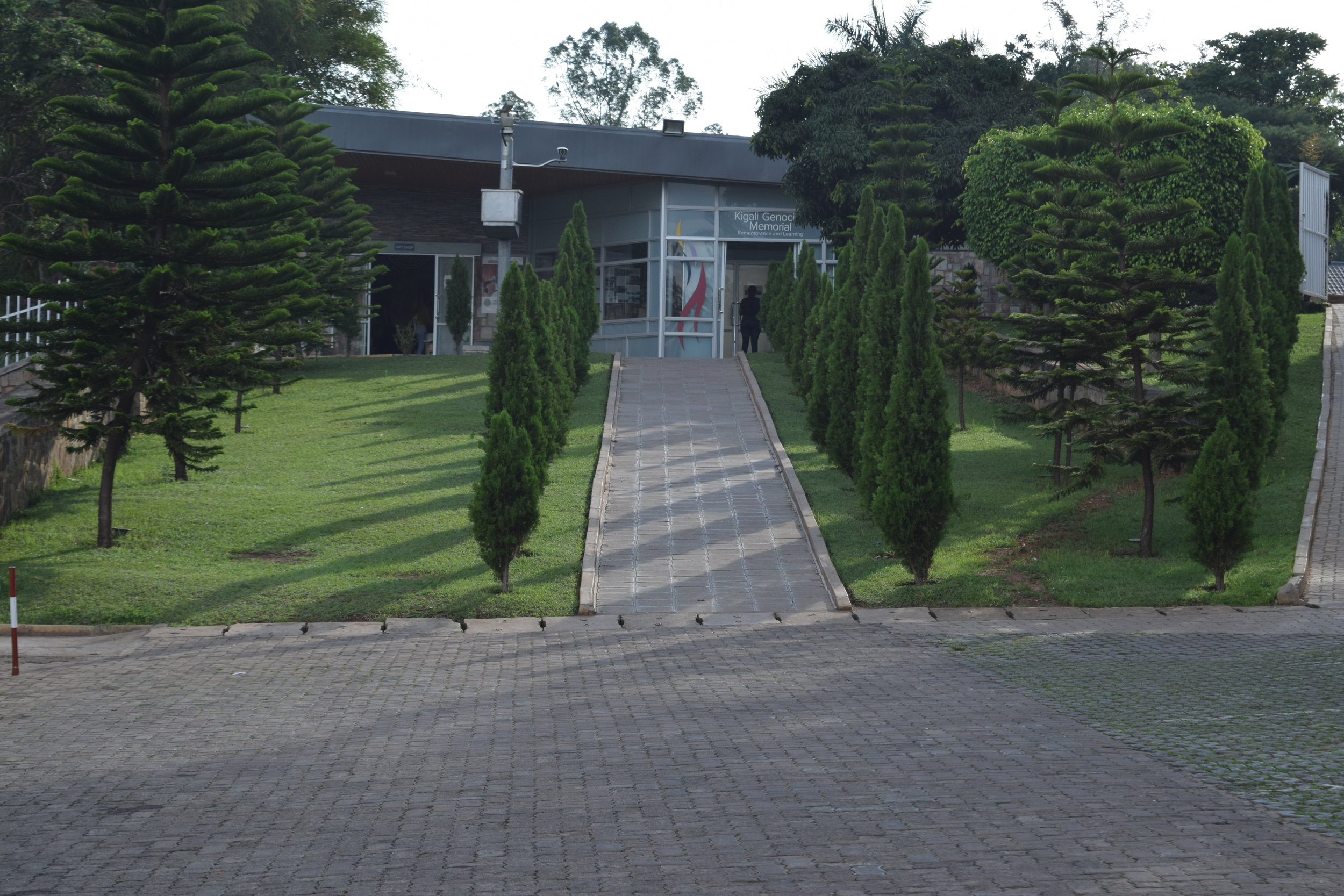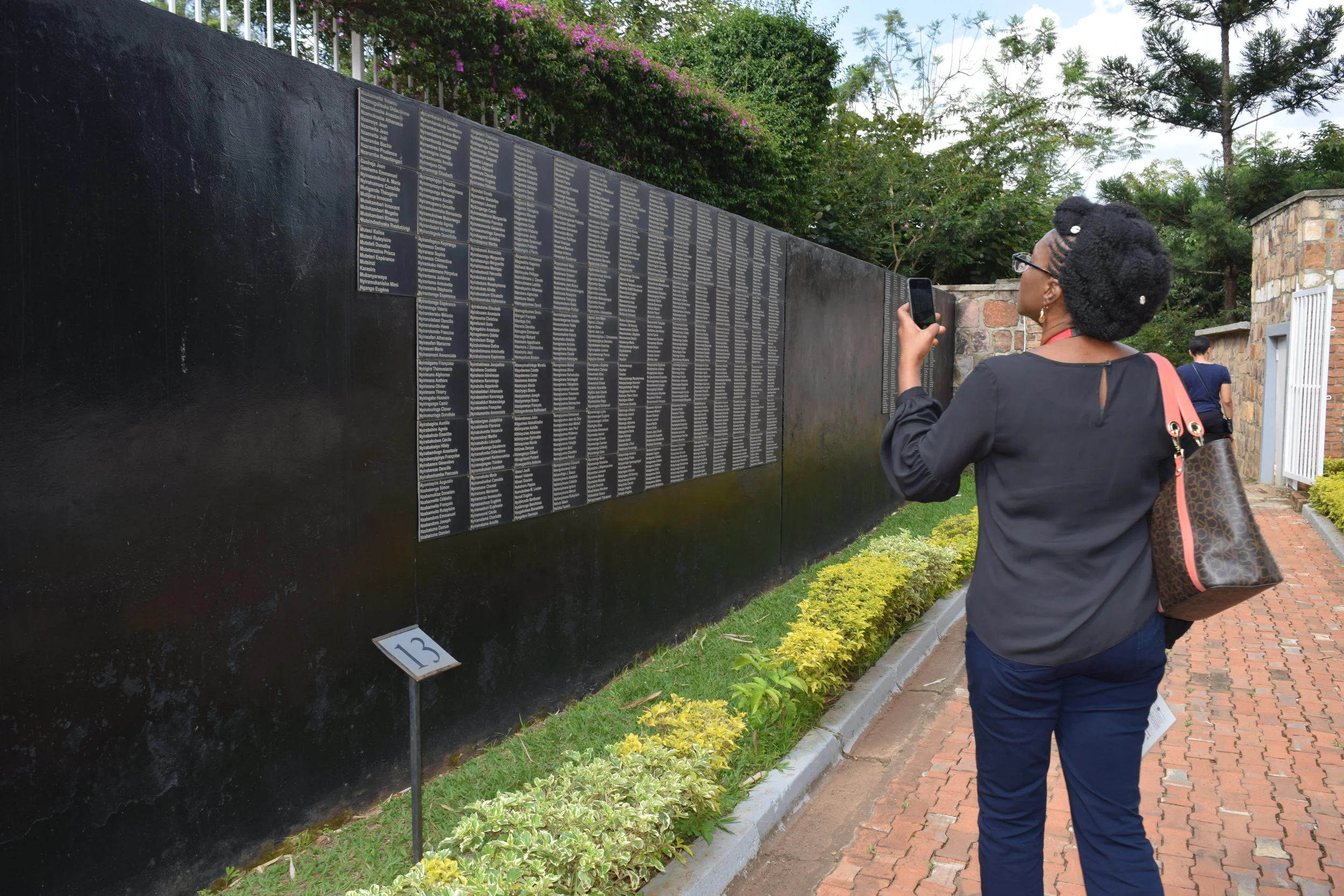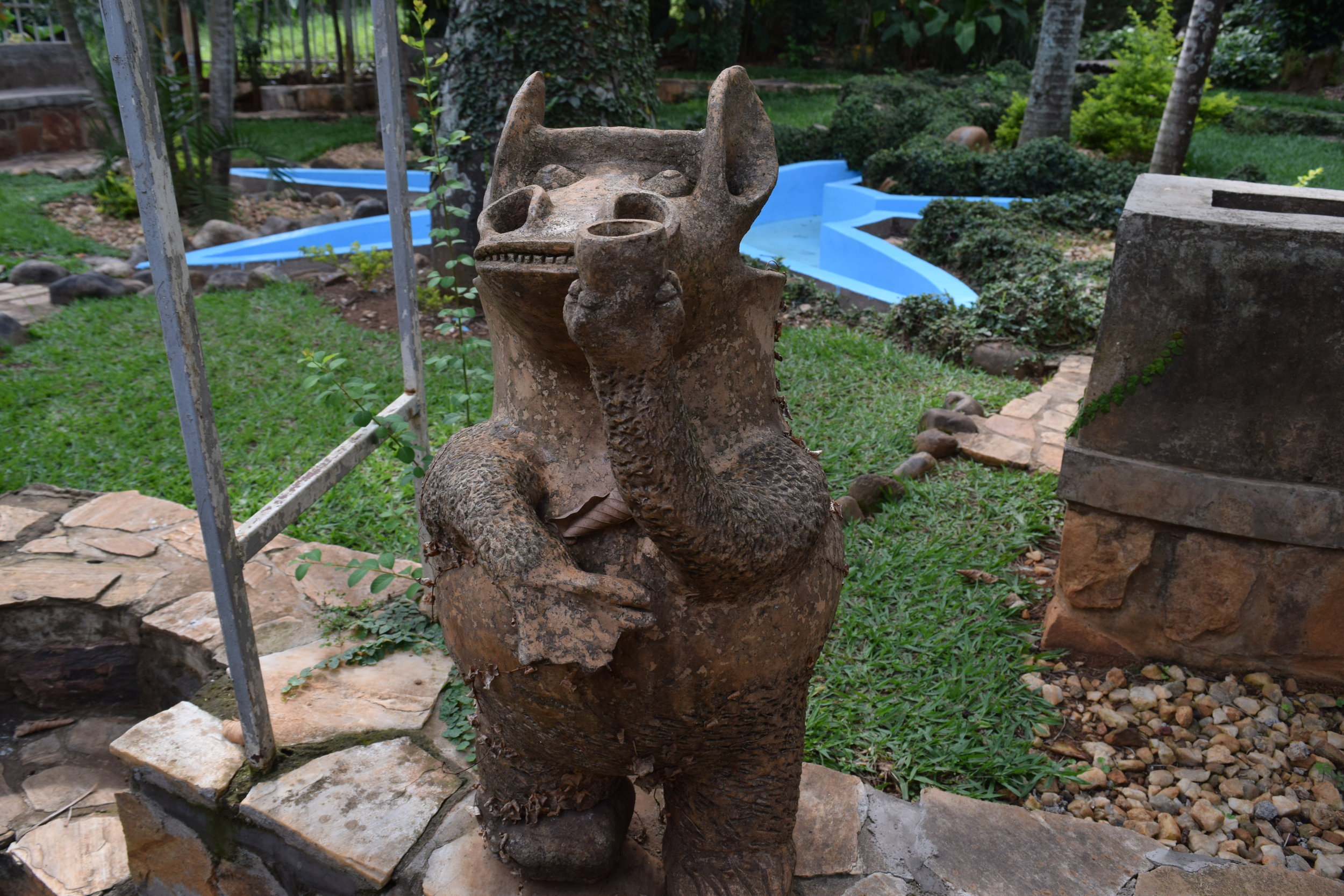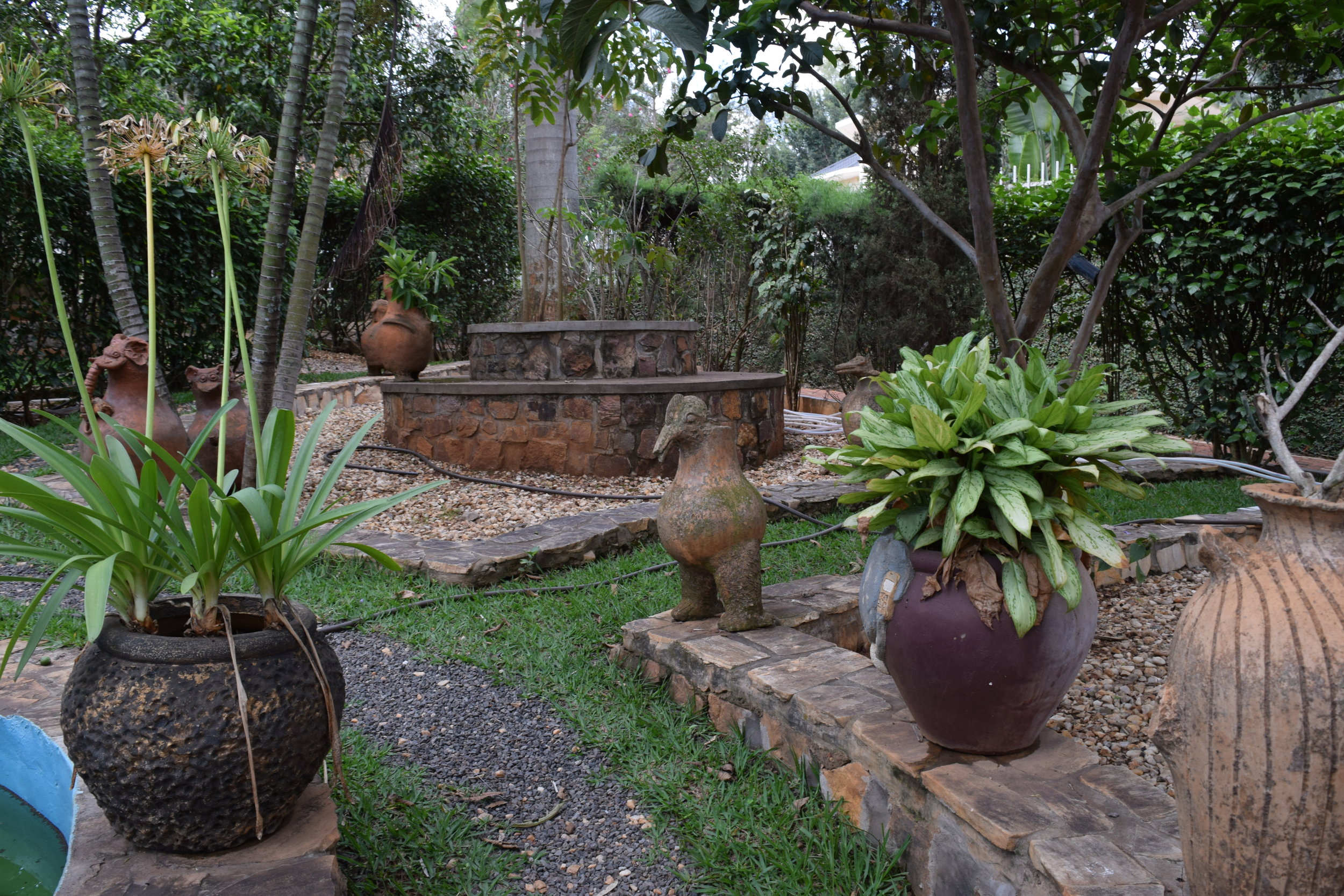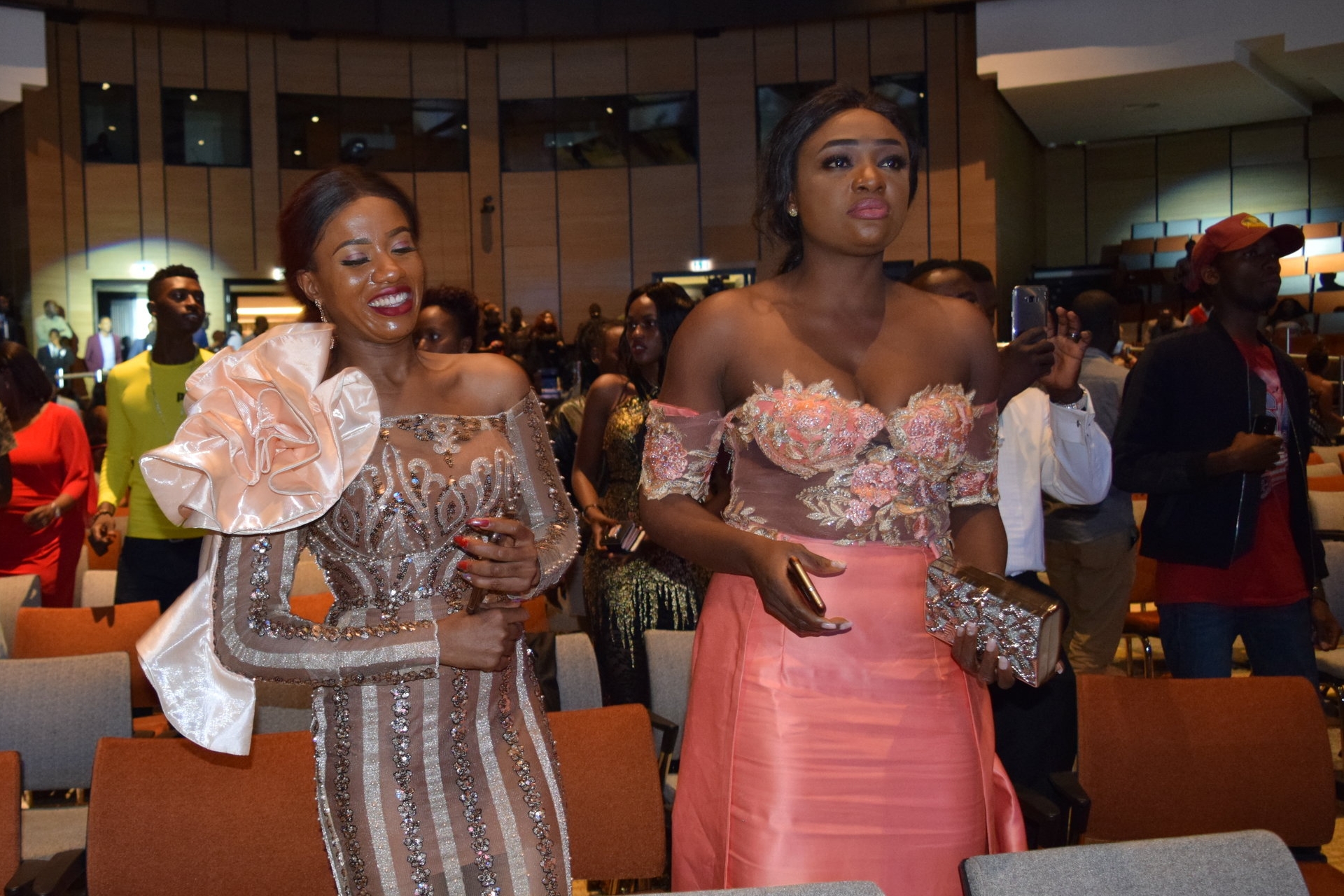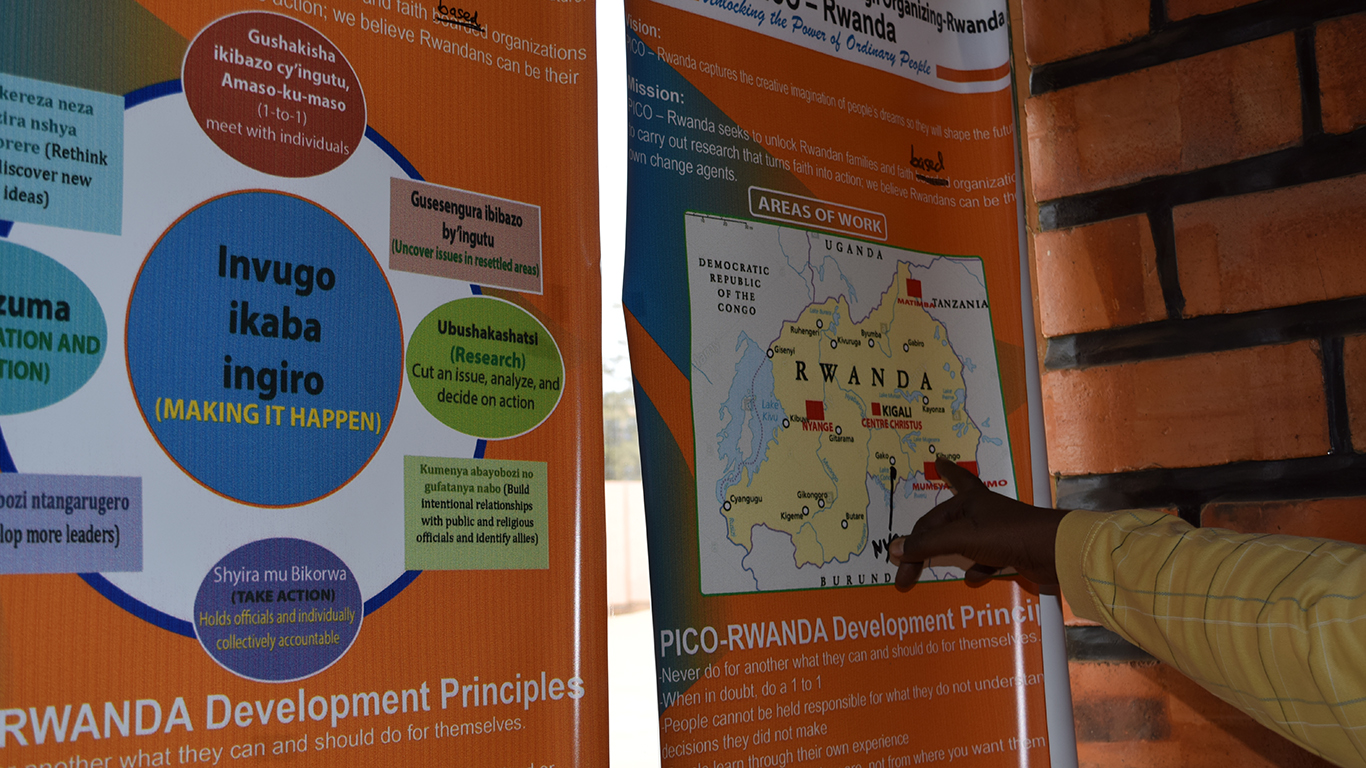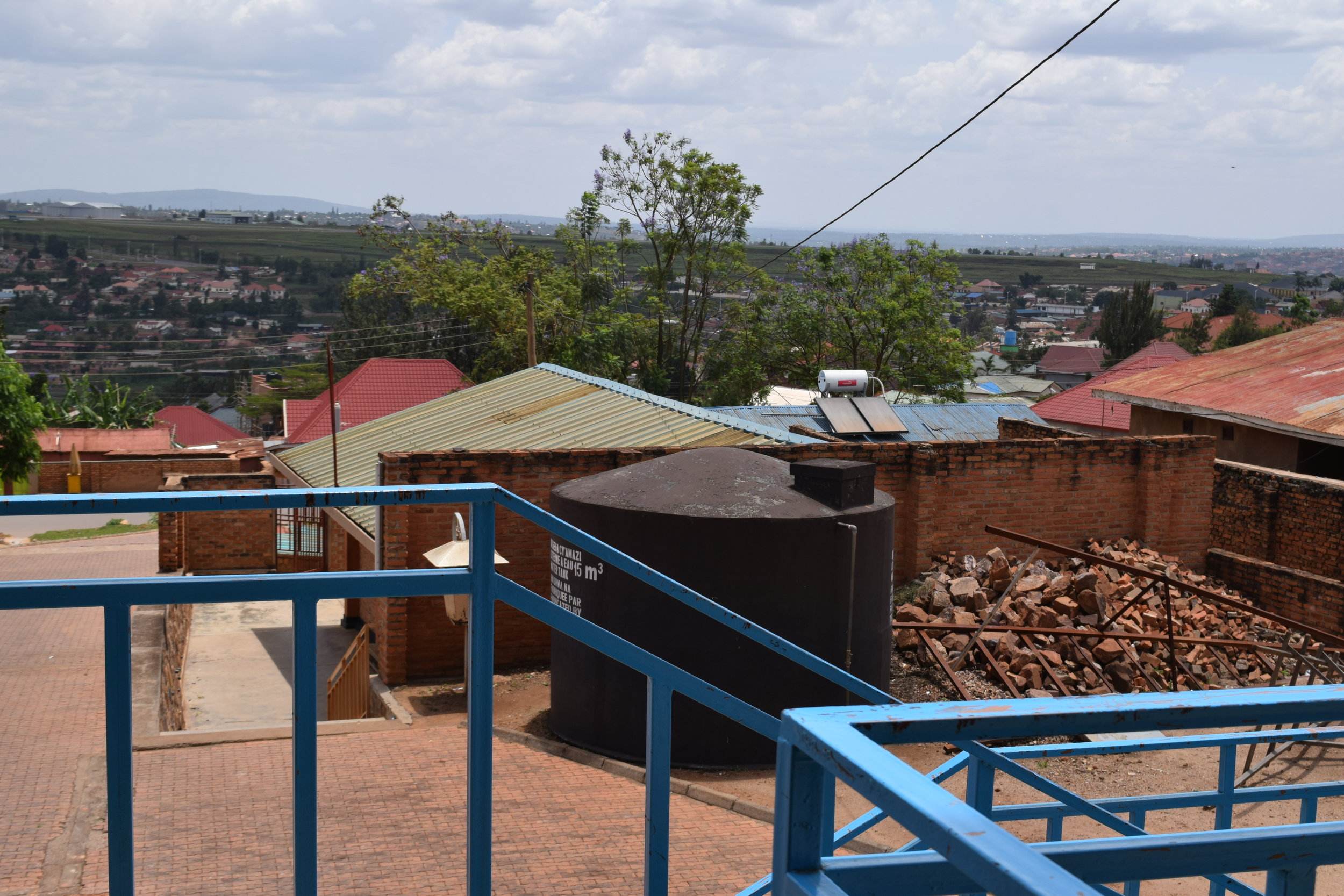Words and photos by Cheryl Fabio
With the City of Oakland’s KTOP TV, I produced and directed a feature length documentary film, “Evolutionary Blues… West Oakland’s Music Legacy.” By capturing local history through the stories of Oakland Blues culture, our film has had a solid run for the past year. We have been in festivals, we’ve had private screenings, we’ve been invited to screen it and we’ve four walled theatres. This trip to Rwanda is the result of participating in the Los Angeles based Pan African Film Festival (PAFF). I learned of the African Movie Academy Awards (AMAA), at our PAFF screening and decided to submit. “Evolutionary Blues…” was nominated as Best Diaspora Feature Length Documentary. AMAA’s gave me a month notice for a four-day trip. Really?
Eventually, it dawned on me that I was about to travel to a place that I knew nothing about. The history of Rwanda is complex, and what I knew came primarily from a Hollywood film, “Hotel Rwanda.” I looked for material online that could anchor my understanding of what happened in 1994 to Rwanda. I looked for materials that reflected local voices. I skipped past colonial perspectives, those world views that didn’t lift a finger during the killings. I hoped to find a frame for my time in Kigali, Rwanda.
My contract and income for “Evolutionary Blues…” with the City of Oakland ended in April. But given the Oakland music icons in our film from the 1940’s to the 1970’s, the film continues to have legs. I take it where its invited. By polling Facebook friends, it became clear that a trip to Rwanda shouldn’t be passed up, not because of money. Facebook friends committed to fund the trip, so, I started a “Go Fund Me” campaign.
With AMAA’s 3-day hotel stay I needed at least an airline ticket. I’ve been working on a short-term hourly job that agreed to give me the time off. My intern, Amir Clark, from our film project, pitched in and found me a 30% reduced airplane fare.
The first book I read, was “We Wish to Inform You That Tomorrow We Will Be Killed with Our Families.” It was a compelling read. I chose the book partly because the President of Rwanda, Paul Kagame, supported its story. It was a page turner. But the writer, Philip Gourevitch intonates that Tutsi victims simply resigned themselves to death, no resistance. I couldn’t understand that would be true, if you are going to die, why not fight back?
I went to the main library and asked for help in locating any non-fiction on Rwanda. I went to local branches to collect what the main library didn’t have. I came home with ten books and narrowed that to five.[1] Within a week I could gain an understanding of where I was going. I jumped into learning.
The Christian testimonial was the 1st book, largely I couldn’t imagine how the church justified its role, or why people accepted it. Googling Rwanda shows a large part of the population in Rwanda is Christian. In, “My Father, Maker of the Trees: How I survived the Rwandan Genocide”, a young man at first challenges the Church’s, then Eric Irivuzumugabe, the writer, reconciles that sentiment by reasoning that clergy failed to protect those who took refuge in the church, then aided perpetrators by reporting the Tutsi presence, and locking the doors which resulted in massive Tutsi death, because those actions were personal lapses of judgment and not a failing of the Church. In the end, his faith helped him escape, survive, and later, cope with his trauma.
All of the authors had European co-writers which I imagine helped get the stories told and sold. Through these books, I read the accounts of many people still struggling with the aftermath of genocide: survivors, perpetrators, and an unmitigated series of testimonials by women who as an act of war, were sexually assaulted.
By the time I caught my plane, I was on the last book “The Girl Who Smiled Beads: A Story of War and What Comes After.” Clemantine Wamariya’s book was published in 2018 and was a chance to hear from a victim of genocide 20-years after its onslaught.
Clemantine, a child of seven journeyed up, down and around, Rwanda with her older sister fleeing the violence of the genocide. After many years of escaping death, they both sought and received US Refugee status. Once in America, Clemantine an early teenager, was adopted by a white American family. The older sister, at that time had her own children and made her own way. The age difference between these sisters was about seven years, so the older girl was very young to be responsible for their survival. In spite of her age, she masterminded a escape route that continually took heralding twists and turns.
While the sisters stay in touch, Clemantine spends much of the book exploring the dynamic between them. A child when her world was disrupted, Clemantine, continues to yearn for an intimacy and the sense of affection that her sister didn’t seem to provide. A big part of their story, is that these sisters are re-united with their Rwandan family live on the Ophra Winfrey Show a nationally televised event. Seventeen years had passed, since being with their parents. And while the girls had discovered the family was alive, the re-connection was ruff and it didn’t go well. The family stayed in the US for four days, not enough to overcome the awkwardness.
My plane ride to Rwanda was long - 32 hrs. Jet Blue got me from San Francisco to New York. Qatar Airlines flew me from NY to Doha, Qatar, then to Entebbe, Uganda and finally, Kigali, Rwanda.
My seat was in economy, but I came to understand the lure of first class. The front half of a Qatar plane is 1st class, individual cubicles, equipped with ample room to stretch, plugs for many electronics, the ability to sleep prone, and an airline provided a sleeping bag! While my food was great, 1st class food was more and more up-scaled. First class passengers also got classy trinkets! Yet once I passed through the front section, and remembered what it cost, I forgot about it!
We arrived in Doha, at about 1 pm on Thursday. The airport was bustling. Thousands of people going up and down escalators, flashing electronic billboards, all types of shops. I wanted to explore Doha beyond the airport. Google describes Doha, Qatar as an “Arabian Gulf country. Qatar, is a modern city on Doha Bay. Ringing its downtown waterfront are numerous parks and the Corniche Promenade. On a man-made island, the I.M. Pei–designed Museum of Islamic Art houses an extensive collection from across the Muslim world. At Souq Waqif, a traditional market, vendors offer goods like clothing, crafts and spices.”[2] It also said, Doha, Qatar - the richest country in the world!
The airport sported typical Duty Free Shops boasting of fine chocolates, spirits and designer handbags, but more interesting were the restaurants that roped in travelers with menus that flaunted caviar, lobsters, and Japanese sushi. Modanisa is a shop that sells high fashioned, high quality, and high priced Hijab Fashions. Everywhere I looked there were shops selling cases and cases of gold jewelry.
When I first de-boarded the plane, a young man confirmed that, yes, I was headed in the right direction, but the country was experiencing tensions and I needed to remain aware because things aren’t always what they seemed.
I made it to my gate and checked in with just a bit of waiting. Entebbe International Airport in Uganda was a stop-over. It was raining and the grey sky, red dirt, and hand painted blue airport felt familiar. I wondered if the familiarity was from the Idi Amin film. We were in Entebbe only an hour, I didn’t get off the plane. As Qatar Airline’s flight attendants welcomed new travelers, almost all African, I noticed the attendants were primarily Asian, a few Arabic, but all with milky white skin. Their whiteness was striking. Where were the African attendants? How can an airline justify doing business in an African country and not hire from them?
On a short 4 day stay, I waited at Kigali International Airport for 3 hours for the promised pick up. Taxi drivers worried that I was waiting too long. The taxi drivers in Rwanda wear suites, and ties, they drive Mercedes Benz cars, and their carriage is elegant. I thought about Pullman Porters.
A young arriving passenger stood next to me as he waited for his ride. We chatted while he waited. He shared that he was arriving from Sudan, but Rwanda was home. He is an Aid worker in Sudan and has worked there for three years. He described the suffering, the chaos, and the turmoil he witnesses daily, it’s inconceivable. His job gives workers periodic, 8 to 12 week vacations, to address worker trauma and avoid depression. He asked how old I thought he was, I guessed 27, his age is 33. He would have been 4 during the Genocide.
As the sun began to set, my phone lost its charge, and I realized I didn’t know the address of my hotel. Just as my worry grew, Aldolpho from AMAA showed up with my name on a sign, he was my ride to the hotel.
Aldolpho follows international news, and his news seemed more solid than mine. He talked about American journalism, Californian politics, wildfires, and of course our President. Climate change was on his mind, and American gun violence. Also, the fact that the polarization of American politics has world implications. He questioned if the election of Obama brought American racism to the surface, I said of course.
I flipped the conversation to Rwanda, and Aldolpho noted that although Rwanda is small and poor, there isn’t the same wealth gap in Rwanda that’s in America. He emphasized that Rwanda has NO homelessness, no one!
He also reminded me that plastic bags were illegal in Rwanda. He boasted that Rwanda is the cleanest city in the world! Each month, everyone, President included, hits the street for monthly clean-up day. In this slow-paced atmosphere, Rwanda is a good place for raising children. The pacing is an opportunity to get things done.
The Onomo Hotel, is what AMAA organizers texted as my lodging. Aldolpho, instead, took me to the Park Inn, a Radisson Hotel. Park Inn is close to the airport, but everything had slowed down because this day was the first rain. It’s the end of the tourist season and the beginning of the rains. The temperature was 72o, there’s a strong breeze that pushes the humidity and people, he said, were cancelling business meetings because it’s just too cold. We both chuckled.
The Park Inn is elegant! The registration area was decorated with locally made wooden scooters and colorful wire baskets. The reservation agents are gentle, soft-spoken and professional. They examine you through your eyes, and divert their own. Aldolpho got me checked in. There was a lot of talk in Kinyarwanda, a beautifully rich cluster of sounds, that make up the first language of nearly all Rwandans. He tells me after the chatting that they wanted to know if I was his mother.
I have two days of travel, and 1 activity day for AMAA’s celebration. I’m here for the Awards program. The Rwandan film festival, showed “Evolutionary Blues…” in September. Friday evening some of the filmmakers were planning on going out partying. I went to bed.
Saturday morning, a bus took us to KCEV Kigali Conference and Exhibition Village to celebrate the end of a film training program for Rwandan youth that was organized and conducted by a group of Cuban filmmakers here for the AMAA event.
In addition, AMAA held quick workshops and discussions on film funding and distribution.
The venue is Kigali Conference and Exhibition Village which is an econmic opportunity project designed to bring opportunity to a new generation of small business owners. These promising entreprenuers are generally connected to a behind the scenes community organizing effort. By creating an upscale presentation, with unique local products, and a collective atmosphere the plan is to make this a destination for local events, shopping and travellers who want to support community building.
I purchased gifts for family and coffee for me, all while listening to the presentations!
After the workshops, I connected to a Nigerian business woman who agreed to joined me in a taxi and visit to the Genocide Memorial.
The experience of visiting and digesting the whole of the Kigali Genocide Memorial was exhausting! The degree of horror, the intimacy in being chopped by machetes, or bludgeoned to death with hammers, and raped and shot with riffles - by friends, sometimes family, and certainly your neighbors raises a level of living in fear that should be unimaginable. Dehumanizing people by calling them names like “cockroach” starts the process. Rwanda continues to be a reminder everyone has to speak up. We have to be involved. We must be vigilant because people are capable of doing the unthinkable.
The memorial represents the proposition of that a country that can face its most difficullt moments can begin the process of rebuilding. Over 800,000 people were tortously killed, while the world watched, none of them doing anything to stop it. 800,000 people in 100 days. Mind-boggling.
It’s raining now. We returned to the hotel, changed our clothes and waited for the bus to take us to the Awards program.
The African Movie Academy Awards (AMAA) is the culminating event after a year of effort that pulls together a film festival and a juried selection of films presented as category winners. AMAA is largely a Nigerian effort with a Pan African interest. This is the second time this Awards program is being held in Kigali.
Peace Anyiam-Osigwe, founder AMAA
According to founder and Director, Peace Anyiam-Osigwe, in a November 13th, 2018 Premium Times article, Abuja “AMAA…began in 2005… [AMAA] held the nominations gala event in Kigali in 2017… to expand the frontiers of unity and integration in Africa. AMAA remains the biggest and most credible jury-based reward system for filmmakers and professionals in the motion picture industry from Africa and Africans in the Diaspora. … AMAA is the longest running Pan-African awards in the whole of Africa,” she said.[3]
In addition to everything else, the event requires visas for everyone, negotiations in a different language, and to some extent working through details from another country with a different culture and rhythm.
As Nigeria continues to build its commercial film industry, "Nollywood," a star-studded, glitzy, sparkly event such as this, is a stage that shows the world that AMAA does things big! For 2018, the venue was the Intare Conference Arena.
The dresses were amazing, African talent from traditional to contemporary were presented on stage. Lots of Nigerian celebrities. All of this juxtaposed against a quiet Rwandan nightscape.
The three films nominated in the category of Diaspora Documentary Feature Film were:
Evolutionary Blues… (USA),
Barrows: Freedom Fighter (Barbados) (WINNER)
Sammy Davis Jr. – I’ve Got to Be Me (USA)
I felt honored to be in the mix.
The selection of judges was stellar, while they didn’t attend the event, Ayuko Babu (from LA's Pan African Film Festival) participated in the selection, film luminaries from Africa, and my favorite - Charles Burnett, L. A. (remember “Killer of Sheep?”). It was a 4-hour event, I got back to the hotel at 2:20 am early Sunday morning.
Later on, Sunday, I met Muyo Simui, a South African delegate to the Pan African Parliament (PAP) in the Hotel café having breakfast. I had seen delegates for PAP at the airport, so I was aware there was a convening. Their sessions would run for two weeks in Kigali and were presented under the theme: “Winning the fight against corruption: A sustainable path to Africa’s transformation.” As we chatted and shared the breakfast table, Ronke Shiru, a cable TV manager in Lagos, Nigeria joined us. It wasn’t lost on me the weight of the three of us from far points in the diaspora engaging in an amazing exchange that included Rwanda, our careers as women, international, and African politics, and, of course, America under Trump.
Muyo went on to her meeting and Ronke and I decided to find the local market place and see “Hotel Rwanda.” “Hotel Rwanda” is a functioning hotel, the site of which was renamed for the Hollywood film about Paul Rusesabagina (Don Cheadle, 2004). Paul, in real life, was the hotel manager who successfully hid and protected 1,200 Hutu and Tutsi refugees from the Interahamwe militia during the 1994 genocide.
As we ventured into Kigali, I Googled the city and found “Kigali has been Rwanda's economic, cultural, and transport hub since it became capital at independence in 1962. The city hosts the main residence and offices of the President of Rwanda and government ministries. The city is within the province of Kigali City, which was enlarged in January 2006, as part of local government’s re-organization in the country. Kigali's city limits cover the whole province; it is consolidated. The city's urban area covers about 70% of the municipal boundaries.”[4]
We drove past the president’s residence. The grounds were large and well protected. The presidential residence is right next door to the National Bank of Rwanda (BNR). The Bank is active in promoting financial inclusion policy and is a leading member of the Alliance for Financial Inclusion. It is also one of the original 17 regulatory institutions to make specific national commitments to financial inclusion under the Maya Declaration during the 2011 Global Policy Forum held in Mexico.[5]
The President’s residence and the Bank are very close to the Hôtel des Mille Collines (Hotel Rwanda) which, luckily isn’t far from the Park Inn.
When we got there, I was surprised that the memorial seemed small and placed in an obscure location. It stands no taller than me, and I only knew it was there because the guard pointed it out. I felt conflicted over the level of acknowledgement. Those feeling got mixed into using a synonym for the name of the hotel. I admit to eating two tree tomatoes, their taste is a curious blend of tomato and fruit. And as the heat fermented it all, including a brief visit to a cute little village of shops linked together in tuff sheds like those Oakland uses for homeless people, my body just gave out.
I had been holding it all in, all of that reading, and the details of this trip, working at my job until I got on the plane, a 32-hour plane ride, meeting AMAA’s schedule, visiting the memorial, facing the horrors of the genocide, the super late-night awards event, and those two tree tomatoes. “Hotel Rwanda” actually Hôtel des Mille Collines, just topped it off and my body just revolted. I left gifts at the foot of the monument. Many gifts. My sister calls it a purging.
It was here that my stomach erupted and all hell broke loose. I rushed back to my hotel and sleep for 16 hours.
When I woke, I felt refreshed and almost healed. It was 7:00 am, my final day and I had not seen anything of Kigali. I hadn’t seen one child walking down the street. I knew I was missing life in Kigali.
As I ate in the hotel cafe, quietly and by myself everyone else had left, I used the time to catch up reading. Eventually, I called Innocent Rugaragu who is the Regional Coordinator for Jesuit Community Center Christus, Remera.
I had Innocent’s number because the Reverend Damita Howard-Davis, Political Director at Oakland Rising Action where I was working, introduced us by email.
As the Regional Coordinator for the Jesuit Community Center, Innocent has overall accountability for the rectory, the grounds, activities, and a facility of 40 guest rooms that are reasonably priced and available. In addition to Innocent’s duties at the Center, he is the assistant to Pastor John Rutsindintwarane, the founder of PICO Rwanda. PICO started in Oakland, CA but it has programs in Rwanda, El Salvador, and Haiti.
Innocent told me about PICO’s network of volunteers. The organization builds community organizers through leadership training. The trainees develop projects that promote African self-sufficiency. Whether it’s re-orienting women who have been sex workers into becoming small business entrepreneurs, or transforming the lives of female victims of sexual terrorism into health organizers, PICO’s projects organize, demystify, and build self-sufficiency.
Innocent picked me up at 10:00, and I spent a few hours with him and found the Rwanda I was looking for. We went to the real local market, and had lunch at the Jesuit center.
My questions were welcomed and his answers were straight forward.
I visited the church Innocent attends. We went by the small PICO office, that houses the two staff, John and Innocent. From this one room, they administrate and organize 200 volunteers all over Rwanda. Those volunteers develop projects that affect quality of life issues for about 200,000 Rwandans. Innocent explained their leadership organizing model involves improving community through organizing which is accomplished by unlocking the power of ordinary people.
PICO helps Rwandans turn faith, into action. By gaining skills in peace-building and sustainable civic, economic, and social development. Sustainability is the goal. Training supports the leadership capacity in rural areas. The participants learn to negotiate with public officials. It leads to tangible projects like construction of health clinics, improved water/electricity access, and environmental protections. PICO-Rwanda is becoming a model for Rwandan/African development. A model “that moves war-torn communities from crisis to sustainability.”[6]
We lunched at the Jesuit Community Center. I shared the meal with five resident Fathers. All of them greeted me warmly and with familiarity. They shared their knowledge of the Bay Area and welcomed me to their table. A home cooked, hearty, split pea soup (exactly what my stomach needed), together with potatoes from their garden. A beef stew with a chili like sauce, and fruit made the meal. It was a magical visit. I was excited to hear they raised beef and sheep on their farm. When I expressed interest, we walked outside!
As assistant to Pastor John Rutsindintwarane, Innocent make things happen. Father John is a native Rwandan, who founded PICO Rwanda. He interned at the Oakland PICO for a year then formed PICO Rwanda in 2006.
While I didn’t get to meet Pastor John Rutsindintwarane because of an unexpected business meeting, I knew that sparing Innocent had been a sacrifice of resources on the program.
When I got home, I looked up Innocent on the internet. Honestly, I didn’t know if Inncoent was his first name or his last name. I found Father Innocent Balthazary Rugaragu, SJ who has received two BA degrees, 2 MA degrees and his Ph.D. Innocent is his first name, Lol, he’s studied at Santa Clara University, the University of San Diego, and The School for Conflict Analysis and Resolution, at George Mason University based near Washington, D.C. While he began his studies in Zimbabwe, the most refreshing thing about Innocent is that he brought all of that training home.
The PICO Rwanda website says: “Pastor John Rutsindintwarane…was motivated into his work by the devastating effects of the 1994 genocide and the overwhelming barriers faced by the survivors. This fueled his search for tools to rebuild his country, combining faith with action, and building from the ground up.”[7]
PICO is preparing to change its name to Faith in Action International. In Rwanda, it was formerly called Congregations Rebuilding Community in Rwanda (CRCR).
When a friend asked me about my trip. I replied- “It’s funny, it all went so quick. Profound moments were locked in a look or some other equally subtle experience. Each time I talk about this trip I tell about a different moment and it becomes a different trip.”
I journaled each night:
Rwanda is beautiful –the amazing red clay, framed by lush greenery, slight hills and backdrops of handmade bricks stacked into housing and crowned by tin roofs or clay tiles. Downtown is modern, high rises loom everywhere with lots of building construction in the works. There are motorcycles zigging and zagging- speeding by in such chaotic streams that I have no idea why they don’t constantly crash. Children on the streets, dressed in blue and white school uniforms, they skip along with smiles on their faces, the school day has just ended and its only 12 noon. Everyone mentions Rwanda’s designation as the cleanest city in the world. I haven’t seen a bit of litter.”
The memorial is pensive and respectful. The exhibit is a thoughtful presentation of this history of conflict, where it came from, how it unfolded, and the hope that still resides in Rwanda. The exhibit ends with descriptions of genocides in other countries, least we believe it’s a Rwandan issue. It takes a couple of hours to absorb the grounds and see the exhibit. If an exhibit is exhausting, the actual experience for 100 days and the forever after loss, pain, and disruption, must be… well, what?
Some of the exhaustion is in the thought that we are all complicit when these things happen. America and the world look on, unwilling to “interfere.” We interfere when there are resources to gain, or it serves our own interest. But we do nothing while 1 million people were brutally killed over a period of 100 days, it’s televised.
Jamal Khashoggi’s recent hideous death has been plastered on screens around the world. On Al Jazeera News has speculated this weekend that his body was chopped-into pieces and delivered to different authorities. This disregard for human life is world-wide and is part of all of us and it is in all of our lives.
Rwanda - the little I've seen of it, is COMPLICATED but absolutely beautiful. There's pain and pride. There is an indescribable feeling that this country is on a path toward making its difficult history, its past.
I wish I were here for longer. It's a place I will certainly go back to.
[1] “We wish to inform you that tomorrow we will be killed with our families: Stories from Rwanda,” Philip Gourevitch, 1998 ISBN 0-312-24335-9
“My Father, Maker of the Trees: How I survived the Rwandan Genocide,” Eric Irivuzumugabe with Tracey D. Lawrence, 2009 ISBN 978-0-8010-1320-1
“The Girl Who Smiled Beads: A Story of War and What Comes After,” Clemantine Wamariya and Elizabeth Weil 2018 ISBN 97804551495327
“The Antelope’s Strategy: Living In Rwanda After The Genocide,” Jean Hatzfeld, (author of Machete Season), 2007 ISBN 13-978-0-374-27103-9
“THE MEN WHO KILLED ME: Rwandan Survivors of Sexual Violence,” Edited by Anne-Marie de Brouwer & Sandra Ka Hon Chu, 2009 ISBN 978-1-55365-310-3
[2] https://www.google.com/search?source=hp&ei=C5LrW5OSCOK80PEP9qSMoAY&q=Doha%2C+Qatar&btnK=Google+Search&oq=Doha%2C+Qatar&gs_l=psy-ab.3..35i39j0i7i30l2j0l5j0i7i30j0.3522.14332..15322...0.0..0.220.1334.9j2j1......0....1..gws-wiz.....0..0i131j0i131i67j0i67j35i304i39.nDu9pTz1774
[3] https://www.premiumtimesng.com/entertainment/nollywood/275146-kigali-to-host-2018-african-movie-academy-awards.html
[4] (https://en.wikipedia.org/wiki/Kigali
[5] (https://en.wikipedia.org/wiki/Kigali
[6] http://picointernational.org/rwanda/
[7] http://picointernational.org/rwanda/






